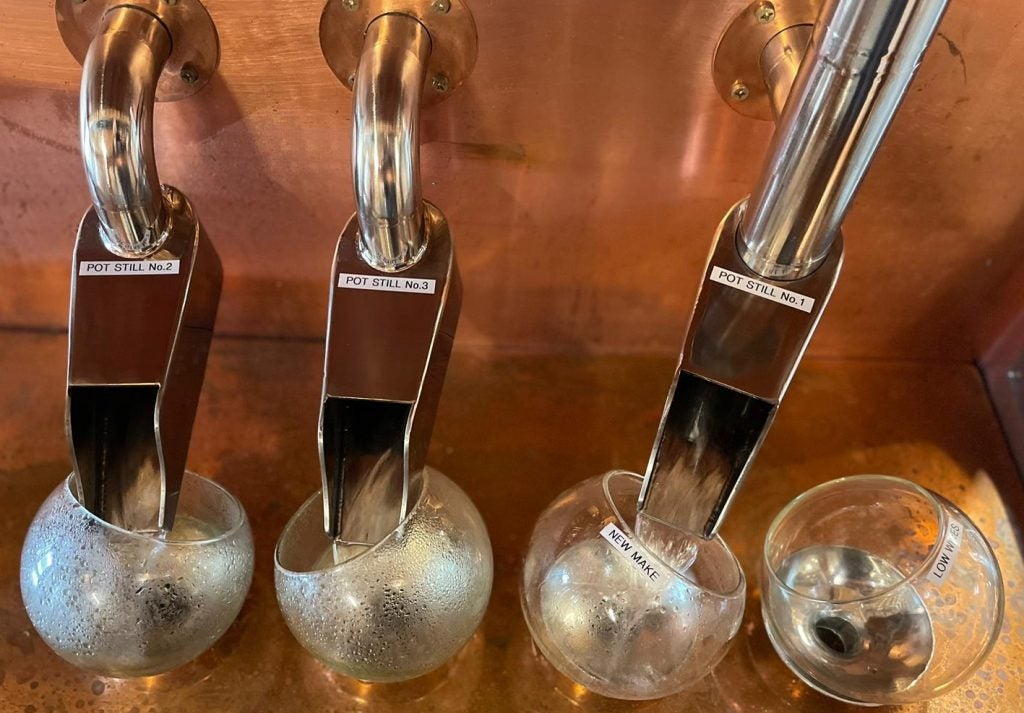
A nation “famed worldwide for its natural water environment and wet weather”, Scotland is not classified as a high-stress zone for water – that’s reserved for the likes of Bahrain, Kuwait and Qatar.
But even loch-laden Scotland is seeing signs of stress, with increasingly erratic weather interfering with water availability.
In May, the Scottish Environment Protection Agency (SEPA) pointed out: “The reality is water is not an infinite resource here. Climate change is bringing hotter, drier summers and is forcing the nation to change its relationship with water.”
One of its three key ingredients, whisk(e)y of all kinds is reliant upon a consistent supply of water throughout the supply chain.
Kirsten James, senior program director for water at Ceres, which assesses beverage manufacturers’ water stewardship, says: “All beverage companies need water at virtually every stage of production… This can result in complex water challenges, including groundwater depletion, water stress and environmental issues, such as eutrophication and ecotoxicity from pesticides and waste disposal.
“As global water scarcity and pollution worsen, so do the financial risks resulting from beverage companies’ impacts to water resources.”

US Tariffs are shifting - will you react or anticipate?
Don’t let policy changes catch you off guard. Stay proactive with real-time data and expert analysis.
By GlobalDataPeople think about energy. They don’t necessarily think about water yet – but I think they will.
Ruth Piggin, The Scotch Whisky Association
In August, the Scotch Whisky Association (SWA) launched its Whisky Water Stewardship Framework to help distilleries look at water use in its broadest sense. Ruth Piggin, director of industry sustainability at the SWA, says water is “more nuanced and less visible” than other areas within sustainability. “People think about energy, they don’t necessarily think about water yet – but I think they will,” she predicts.
The largest volume of water in whisk(e)y production is not used in distillation, rather in the cooling process – and it here where the greatest savings are to be made.
But water stewardship is not only about saving water, it is about protecting the wider environment, maintaining water quality and managing an increasingly erratic climate.
A troubling climate
For the SWA, water quality is “less of a concern” due to strict regulation, of which the Scotch industry is “highly compliant”, Piggin says – though it recently emerged the SEPA fined William Grant & Sons and Pernod Ricard’s Chivas Brothers more than £36,000 ($45,800) for spillages from their Speyside sites in 2022. Both were made to take corrective action to prevent further leaks at the Glenfiddich and Glen Keith distilleries.

However, Piggin says: “Where water is gaining more focus [than water quality itself], is availability. Summer rainfall, in terms of river levels, lochs and aquifers – all of those are quite concerning. And then you have the extremes on the other end where flooding can become a potential issue.”
In the last six years, there have been water-scarcity issues in at least one of Scotland’s catchment areas every year. In 2020, SEPA set out the country’s first national plan to “manage water-scarcity events”.
During the particularly dry summer of 2018, groundwater supplies to Chivas Brothers’ Glenlivet distillery in Speyside decreased and did not replenish until the following spring.
In 2021, ThaiBev-owned Pulteney distillery in Wick paused production due to “perilously low” water levels in its sole water supply, Loch Hempriggs. Last year, groundwater levels in the east of Scotland reached their lowest since records began in 2009 and there was below-average rainfall in eight out of twelve months.
Weather is also becoming more erratic. In a “stark” comparison, July recorded nearly double the normal amount of rainfall in some areas that were experiencing significant water scarcity in June, according to SEPA data.
Piggin says historically the east of Scotland tended to be drier than the west – especially in summer – but that distinction is blurring: “What we’re seeing happen more often now is drought concerns across multiple areas of Scotland. It’s not just confined to the areas we might traditionally know may be more vulnerable to water availability in certain months.
“The Highlands was an area this year actually struggling for water availability and it was one of the first on the drought-watch lists for SEPA. The Borders were as well. That’s a feature from our changing climate. We expect rainfall to keep reducing in the summer months – maybe balanced out in the winter months.”
Why conserve water?
“The more water that is being used by consumers, industry, agriculture or commercial properties, the less there is in the environment. And if you have periods of low rainfall, in particular, combined with higher temperatures, it starts stressing plants and animal life forms in those areas,” explains Piggin.
“But there is also another impact: waste in general impacts our broader footprint. And it’s a principle that’s been very strong in whisk(e)y as in other sectors.
“Reduction of waste is just good business sense. But it’s also good environmental sense, because pumping, moving and heating water takes energy, energy equals emissions. Therefore, if you can use less to do the same job, you’re reducing your emissions as well.”
There is also financial risk to water scarcity if distilleries are forced to close for extended periods. A summer rest period or ‘silent season’ is traditional in the Scotch industry to allow for cleaning and maintenance, simultaneously allowing water systems to replenish. But Piggin predicts enforced breaks might become increasingly necessary.
For Michael Alexander, Diageo’s global head of environment, managing water consumption is “just good operational management”.
“Water is probably the most important piece [within Diageo’s grain-to-glass sustainability work] mostly because it’s important to our ingredients but equally about a third of our volume is produced in water-stressed parts of the world,” he says.
It’s just good operational management to use less of a resource
Michael Alexander, Diageo
Water is as much of a priority in Scotland as it is in water-stressed regions Diageo works in like Africa, Latin America and India, he adds.
“Managing water as a precious resource is a responsibility everywhere. And if you’re managing water well and you’re reducing your demand for water, then you’re actually improving the management efficiency of your operations,” he says. “So sometimes it will save you money. There’s less wear and tear. It’s just good operational management to use less of a resource. Even if it’s sometimes abundant, it’s still costing money to remove it, treat it and discharge it.”
Water solutions
Solutions focus on recycling water in the distillery and managing water sources. Some producers are also working with farmers and bottlers to manage water at both ends of the supply chain.
The Glenlivet has installed “nature-based” measures to protect against a repeat of the 2018 closure, including small dams which capture water during wet periods for use when it is scarce.
University of Aberdeen PHD student Jessica Fennell, who led the dam project in 2022, said at the time: “Because these measures enhance groundwater recharge and groundwater contribution to streams, our research has also raised the possibility of positive implications for water temperature. This is important because distilleries require cool water and groundwater is typically colder than surface water during summer.
“As water temperature is expected to increase with climate change, more water will be needed to achieve the same cooling effects, and increased groundwater flow could help stabilise stream temperatures as well as increase flows through dry summer periods.”
ThaiBev subsidiary International Beverage is trialling high-gravity mashing to minimise water usage in production. It implemented the technology at Pulteney following 2021’s temporary closure. High-gravity mashing reduces water and energy consumption by using a more concentrated wort.
For Matt McKay, director of whisky creation and outreach at Dunphail Distillery in Speyside, “the way to go is closed-loop cooling” when looking to reduce water consumption in the distillery.
“The biggest water usage is always the cooling because when you’re doing it, it’s constantly in flow,” he says. “Your second biggest water usage is mashing and sparging. But that is different in the sense that virtually all of that liquid then goes on to fermentation.”

Dunphail was opened this year by the owners of London’s Bimber Distillery and began distillation last month. It dug its own borehole, which supplies all production water, and installed a closed-loop cooling system which can reduce the distillery’s overall water consumption by 70%, McKay says. Dunphail is also off grid, powered by solar panels.
The distillery’s location was chosen in part due to its access to water quality mineral water. “Minerality is fundamental to fermentation, helping the yeast thrive and produce the flavours we are looking for,” McKay explains.
While Dunphail is still young, it has taken a proactive approach and “put in place a lot of [water] efficiency”. McKay admits this is easier when starting from scratch than trying to integrate the system into a small or old distillery building. “But to my mind, it is the [best] method,” he adds, “short of looking at building wetlands and ecological plants and all sorts of things on the distillery site, which I just think is never going to happen. The most likely and easiest thing to look at is closed-loop cooling.”
Rémy Cointreau-owned Islay producer Bruichladdich says varying weather patterns, particularly in the last five years, have forced it to change the way it operates. The distillery takes its cooling water from a river fed by a private reservoir, An Torran. It takes distillation water direct from the reservoir. The river must be supplemented during hot spells around once a year, occasionally halting production.
Bruichladdich production director Allan Logan has worked in the industry for 23 years and says annual maintenance breaks were always taken in July when it was driest. “What we’re seeing now is… the periods of where we are getting the dry spells are changing, we’re seeing erratic behaviour where you may see dryer spells in April/May, or even going into August/September,” he says. “Now, when the rainfall does come, it is coming in vast amounts in a shorter period of time.”
This year, Bruichladdich invested in a two-stage cooling system that recycles water and reduces the site’s total use by 80%. However, the system is energy intensive and Logan plans to use it between April and September when water levels are lower. “We’ve got weigh up the extra use of energy versus conserving the water now, because we don’t necessarily need to conserve the water during the winter,” he says.
Investing in agriculture
Diageo, which produces over 100 Scotch whiskies, last month launched a regenerative agriculture project in Scotland that includes a water focus. Still in the recruitment phase, the project will work with around 20 farmers.
Alexander says: “For farmers, the biggest challenge is the unpredictability of water. First of all, it’s how you can retain water in your soils to improve soil health and that’s about agronomic techniques like cover cropping and minimum tillage, or no tillage.
“If you look at the average yields over the last ten years, they’ve been reasonably steady… The challenges are to ensure [farmers] are managing their soils so they get the best out of the water they do get and when there are floods that we don’t get lots of sedimentation and soil erosion.”
He adds: “It’s also about how it will be joined up, and it’s not seen as: ‘this is a carbon measure, this is a water measure, this is a nature measure or a biodiversity measure’. We need to have a joined-up approach to make sure that we’re supporting farmers to… continue to remain profitable but also restore the environment on which we all depend.”
Bruichladdich works with around 27 barley farmers and Logan says many are looking at drainage and water runoff to protect soil after increasingly intense rain showers. Last year, the distillery began soil-mapping trial to look at soil health and analyse farmers’ use of agrichemicals – which often increases with wet weather to protect crops from disease and pests.
I see water as one of the lesser issues that we face.
Allan Logan, Bruichladdich
UK farmers are waiting on a government subsidy programme in the wake of Brexit, expected to come into place in the New Year, which could reward progress in sustainability. “I hope the UK government do something that will support the farming industry to create a more sustainable future,” Logan says. “Because the worry is when it takes five to ten years for the land to change and actually produce profitable margins that you can live off, at some point we’re going to have to make that transition and the longer we leave it, the harder it’s going to be.”
Prioritisation and barriers
With plenty of macro-environmental headwinds, distilleries must carefully prioritise water among other business goals.
“I see water as one of the lesser issues that we face – we have probably more pressing issues with energy, carbon, packaging, logistics and things like that,” admits Logan. “I think these are more impactful areas that we need to focus on. Water is important, don’t get me wrong and we’re not taking it for granted… I think we’re probably fortunate enough that the water we’re using isn’t under any pressure at the moment. But that could change and this is why I think protective measures [are important].”

Piggin says the financial risk of trialing new technology can dissuade investment and calls for government support around water. She says: “The Scottish government traditionally hasn’t really funded water projects or water efficiency. Energy has understandably been a much bigger focus – energy efficiency and energy switching have been the focus for funds, projects and even research commissioned by the Scottish government.
“It would be really good to see more attention on water, especially now some of those other technologies around energy are in that stage where it’s not about proof of concept, it’s about deployment. Some of that proof of concept could be quite usefully moved into the water technologies and water-information space.”
She says data is also a barrier for distilleries. The SWA’s Water Stewardship Framework includes a pledge to develop tools and resources to support members with on-site monitoring and measurement.
“If you don’t have the information, it’s very hard to understand where your opportunities are,” Piggin says. “A lot of [information] in terms of measuring at different points of the process, not just measuring the overall numbers, will help improve understanding of where efficiencies can be gained.
“That’s where the work we’re focusing on is – not just taking your total volumes and your total numbers but looking at breaking that down into the modular elements of where water is going in and out of the system.”
While it may not be the first resource that comes to mind when thinking of sustainability in Scotch whisky, water is increasingly on distilleries’ radars.
Looking to the future, it will need serious stewardship and careful management to ensure the industry has the supplies it needs amid an increasingly volatile climate.



